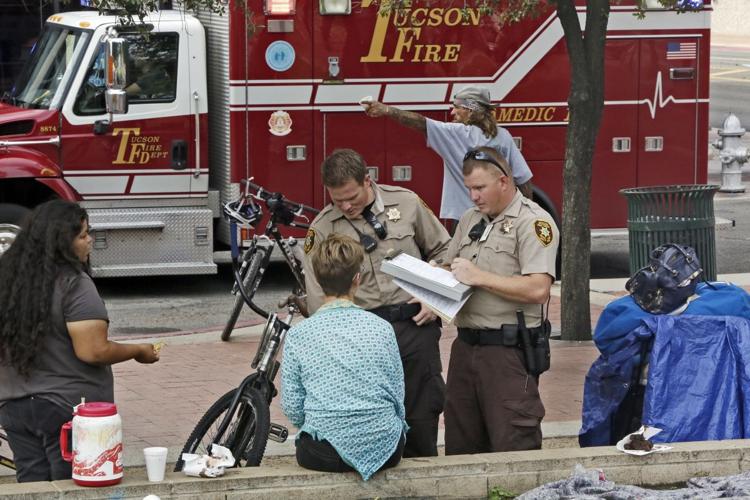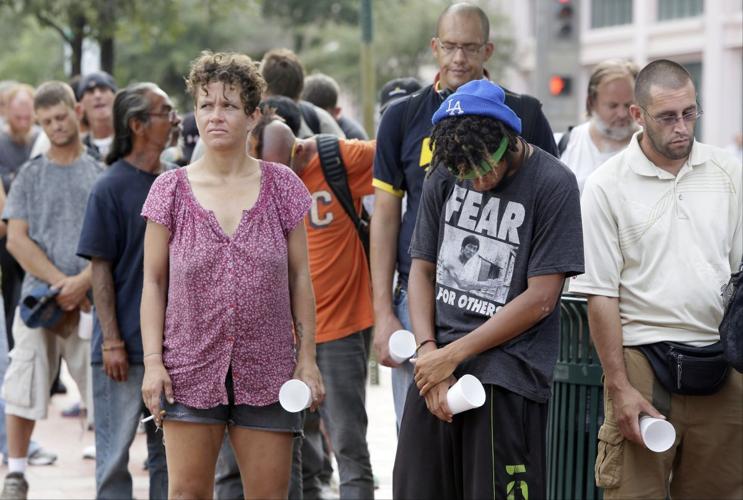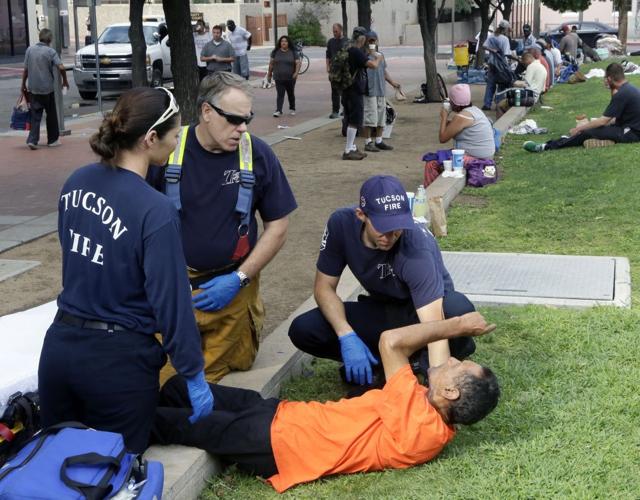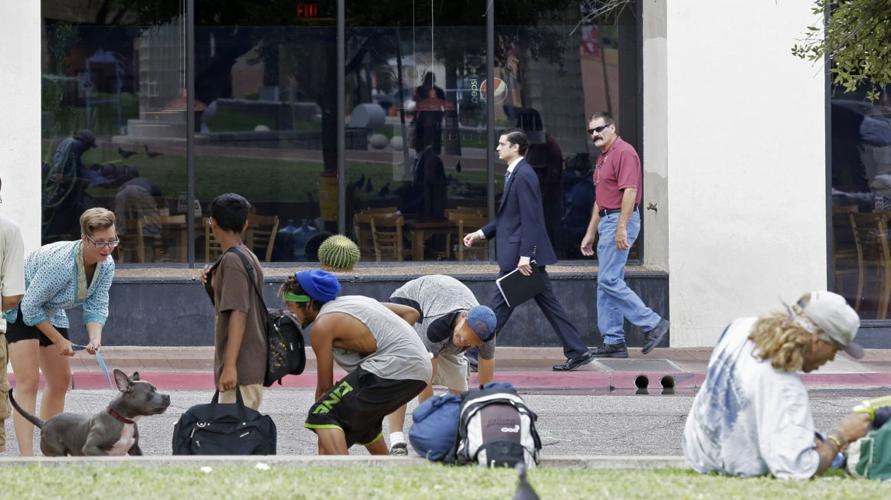A park area in front of the Joel D. Valdez Main Library downtown has become so crowded and chaotic that officials worry about the public’s health and safety.
“On average, I call 911 at least once a day,” said Nicholas Ilka, who owns Roasted Tea and Coffee Shop on Pennington Street across from the library, 101 N. Stone Ave.
Incidents typically involve fights, aggressive behavior and people collapsing in drug-induced delirium, business owners and officials say.
And it doesn’t take long for problems to pile up.
On Thursday afternoon, a screaming siren is followed by the rumble of a firetruck’s diesel engine as it raced to a stop near the corner of Pennington Street and Stone Avenue.
There, a woman splayed on the sidewalk, twitching uncontrollably. Firefighters sat her up and worked to make her stable. It was the second drug-related call for the Tucson Fire Department that day.
Spice rampant
The Fire Department has responded to an average of 60 spice-related medical calls across Tucson each month since about June.
Spice, a generic term for a legal product abused as a substitute for marijuana, is a known problem among the homeless downtown.
Handling spice overdoses can be a problem for paramedics because the symptoms vary widely.
“There’s been times when we’ve had to sedate these guys,” said Anthony D’Onofrio, a Fire Department paramedic.
People overdosing on the substance experience various symptoms, D’Onofrio said, such as lethargy, incapacitation, vomiting, paranoia, hallucination or psychotic delusions.
Treating overdose patients also poses problems.
With substances like heroin or meth, paramedics can use other drugs to counteract the overdose. With spice overdoses, paramedics simply try to stabilize patients before transporting them to a hospital.
“The problem is you see it and people are talking about it like it’s harmless and it’s not,” said Sgt. Pete Dugan with Tucson Police Department.
Dugan said the department doesn’t keep statistics on spice-related calls specifically. That’s in part because its sale is legal, but it’s clear the abuse of the substance has become more prevalent recently.
“I’m concerned with the drug usage that’s going on and the issues of seriously mentally ill people who need help and the unleashed dogs,” Pima County Attorney Barbara LaWall said.
She said the growing number of people spending days and nights in the park has become a safety concern for her employees.
To address the safety concerns, LaWall said her employees can request a security escort to and from court.
Dogs run off leash
One worker in particular recently had a scary experience in front of the park.
Blake, a black Labrador courthouse dog, was attacked by an unleashed dog in the park. Blake is among the dogs taken to the courthouse by Pima County Victims Services to help comfort the families of crime victims.
“He was being walked over to court by his handler,” LaWall said.
The handler kept the dogs apart long enough to get help separating them, LaWall said.
Blake was not injured.
Another dog in the park wasn’t so lucky.
Earlier this week, Pima Animal Care Center enforcement officers helped a nearly unconscious dog found on the park’s grass.
“It was real lethargic and experiencing signs of dehydration and neurological issues,” said Jose Chavez, enforcement operations manager with Pima Animal Care Center.
Chavez said that based on bystander comments, PACC suspects the dog had ingested spice. But the agency was unable to confirm it because no one at the park would claim the ill dog.
The dog remained at the Animal Care Center on Friday and was available for adoption.
Animal-care officials said at least one other dog has been treated at the center for possible spice exposure.
Chavez said PACC officers have been called to the park at least six times in the past month for leash violations and other concerns.
PACC started a weeklong detail downtown Friday to educate people on leash laws, licensing requirements and other animal issues.
Problems increased in June
The number of people spending days in the park began to swell in June, about the same time city officials closed Veinte de Agosto Park at Church Avenue and Congress Street, said Ilka, the coffee-shop owner.
The closed park had been the site of the so-called “Safe Park” protest, where people lived for months in tents and boxes on the sidewalks.
“Since they cleared out Veinte de Agosto Park around June 15, it’s been a massive increase,” Ilka said.
Homeless people have been a fixture in front of the library for years, including the five years Ilka has run Roasted. Until recently, he said, there were few problems there.
“I have always had an easy relationship with the homeless in the park,” he said, adding he used to give pastries to people or let some sweep the floors in exchange for coffee.
“This group is different,” Ilka said.
The chaos has become a concern for library officials as well, Pima County Administrator Chuck Huckelberry said.
“It’s inhibiting free access to the library,” Huckelberry said.
Library workers frequently call 911 to report incidents of violence and drugs, he said.
Drug use became such a frequent occurrence at the library that the county closed the first-floor bathrooms, Huckelberry said.
Tucson City Councilman Steve Kozachik said the city also has concerns with the growing issues outside the library.
“We’re getting daily reports of fights, aggressive panhandling and drug dealing,” Kozachik said.
He said the council plans to vote on an ordinance at its meeting Wednesday to address urban camping.
The issue grew out of the lawsuit the city faces in federal court challenging past efforts to roust people from public parks.
The city needs to be mindful of protecting rights of people assembling peacefully while taking care of the health and safety of the community, Kozachik said.
“We have to put regulations in place that protect everyone’s rights,” he said, citing a recent federal case in Idaho similar to Tucson’s, in which the U.S. Department of Justice weighed in, saying cities can’t expel homeless people from public spaces if the community does not provide services.
“What it didn’t say is that life in the city is a free-for-all,” he said about the ruling.







